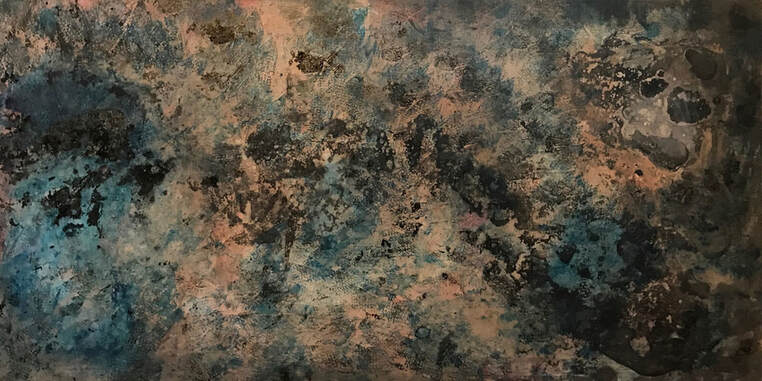Two poems by Emily Lake Hansen
What Work Is
After Philip Levine
This morning you found another
mouse - dead, inside out, devoured
hastily by some creature, save
for its face, the only part still
perfectly whole. It’s the fourth
or fifth you’ve found this summer
lying among the rough grass
of our unmowed lawn. I think
we have an owl, you shout
as you retreat back downstairs
to dispose of the body. You’re good
at it now: gloved hands, a gardening
shovel, you carry them off
tenderly, stacking their corpses
in the neglected compost pile
at the back of our yard. It’s the work
of a previous owner who carefully
built the box by hand. They gardened
along the ditch too, planted roses
we’ve let die. When we moved in,
you cut down their butterfly bushes,
uprooted wild tomatoes, planted
rat traps to catch the strays
scurrying in the basement. You
wanted the work to be simple /
I didn’t know what work
there was to do. I watch you
now from the kitchen window,
standing on tiptoes to peer
over the cluttered ledge. There
you are a figure in the yard: work
gloves gripped around the handle
of the shovel, sweat on your brow.
Bees and squirrels rush around you
to prepare for winter. I pretend
to wash dish after dish, dunk
my hands in soapy water
until they wrinkle at the tips.
There’s work somewhere to do
I know, but I’m busy imagining
the owl: the swoop of its wings,
the sharpness of its talons, the way
its beak must have had to force
through the thickest fur
of the mouse’s back, how much
work to dismantle the body,
find enough meat to fly home.
This morning you found another
mouse - dead, inside out, devoured
hastily by some creature, save
for its face, the only part still
perfectly whole. It’s the fourth
or fifth you’ve found this summer
lying among the rough grass
of our unmowed lawn. I think
we have an owl, you shout
as you retreat back downstairs
to dispose of the body. You’re good
at it now: gloved hands, a gardening
shovel, you carry them off
tenderly, stacking their corpses
in the neglected compost pile
at the back of our yard. It’s the work
of a previous owner who carefully
built the box by hand. They gardened
along the ditch too, planted roses
we’ve let die. When we moved in,
you cut down their butterfly bushes,
uprooted wild tomatoes, planted
rat traps to catch the strays
scurrying in the basement. You
wanted the work to be simple /
I didn’t know what work
there was to do. I watch you
now from the kitchen window,
standing on tiptoes to peer
over the cluttered ledge. There
you are a figure in the yard: work
gloves gripped around the handle
of the shovel, sweat on your brow.
Bees and squirrels rush around you
to prepare for winter. I pretend
to wash dish after dish, dunk
my hands in soapy water
until they wrinkle at the tips.
There’s work somewhere to do
I know, but I’m busy imagining
the owl: the swoop of its wings,
the sharpness of its talons, the way
its beak must have had to force
through the thickest fur
of the mouse’s back, how much
work to dismantle the body,
find enough meat to fly home.
In the event of an apocalypse
remember the wild yard: the blue flowers
that bloomed like whistles between bricks,
the swamp greens growing tall in the ditch,
the weeping cherry you planted
for my 30th, its longest limb shrouded
by the work of a webworm, wispy
strings covering the branch like a net
covers a fish. Remember how hard
we worked to keep things in check,
how you planted traps in the basement
to stun stray rats into fleeing.
Remember too how I once spotted
a shrew - gray and ugly - sprinting across
the tall clover of our lawn. Remember
inside how our tin roof annunciated
the arrival of rain, and how
under it we could listen
to the storm and feel safe.
that bloomed like whistles between bricks,
the swamp greens growing tall in the ditch,
the weeping cherry you planted
for my 30th, its longest limb shrouded
by the work of a webworm, wispy
strings covering the branch like a net
covers a fish. Remember how hard
we worked to keep things in check,
how you planted traps in the basement
to stun stray rats into fleeing.
Remember too how I once spotted
a shrew - gray and ugly - sprinting across
the tall clover of our lawn. Remember
inside how our tin roof annunciated
the arrival of rain, and how
under it we could listen
to the storm and feel safe.
Emily Lake Hansen is the author of Home and Other Duty Stations (Kelsay Books, 2020) and the chapbook The Way the Body Had to Travel (dancing girl press, 2014). Her poetry has appeared in Atticus Review, Glass: A Journal of Poetry, Midway Journal, Rust + Moth, and SWWIM among others. She is a PhD student at Georgia State University and serves as the poetry editor for Minerva Rising Press. When she's not writing, you can find her playing entirely too many children's board games in Atlanta.
Sinejan Kılıç Buchina is a NY based artist and visual instructor. She is of Circassian-Abkhazian ancestry, born in Turkey. She received her B.F.A. in Art in Istanbul, and continued her education with programs in London and Berlin, and completed her MA in New York. Buchina has exhibited in galleries and institutions throughout New York, London and Istanbul, and is currently working on evolving projects in New York, Sukhum and Istanbul.

